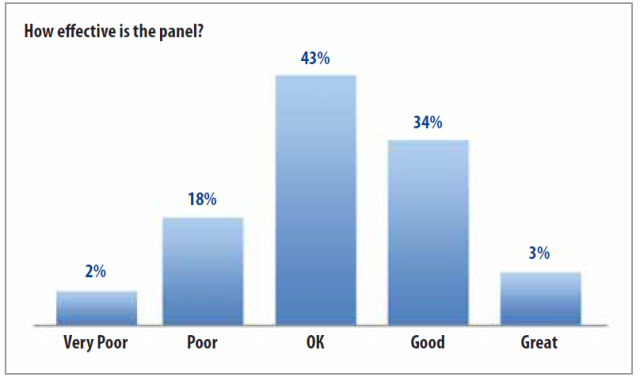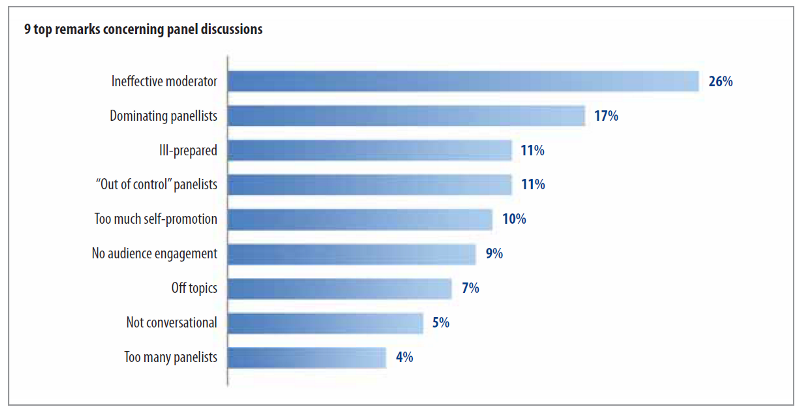During 2014, Quality Process Consultants conducted research “The 2014 Panel Report”, of which the author is Kristin Arnold.
The research focuses on the question how effective panel discussions are and points out the most frequent comments and remarks of the participants.

According to the research, 99% of event participants, during the period of previous 12 months, attended some panel discussion.
Out of them, 63% says that panel discussions are hardly “ok”, poor and very poor. However, the rest of 37% says that the panels were very good, even great.
That fact, according to the author of the report, Kristin Arnold, shows that the very form is not necessarily poor, but what needs to be done is to improve preparation and performance of panel discussions.
The majority of subjects (72%), when listing the causes of dissatisfaction with panels, indicate to the problem with moderators, including insufficient preparedness, too long introductions, omissions in terms of asking good questions, too much talking, self-promotion, poor control of discussions among panelists and poor time management.
Also, some panelists and moderators are not selected exclusively on the basis of their competence, talents, presentation skills or charisma, but, as Arnold states, on purely political grounds.
· Moderator issues
· “Out of control” panelists
· Topic problems
· Poor panelist selection
· Audio/Visuals
Taking into account the established high degree of correlation between moderators’ effectiveness and the overall performance of panel discussion, Arnold says that this information is not surprising at all, and points out: “When you have an excellent moderator, you will most likely have an excellent panel. Poor moderator = poor panel.”
Significant remarks concern the panelists (66% of respondents indicated to this problem), in terms that there are either too many of them, or they stray away from the main topic, they use the opportunity to make self-promotion or promotion of their own products and services, they do not listen to the questions they are asked or their interlocutors.
Problems with panel topics, as said by 54% of respondents, usually concern broadness – topics are too broad, there is not enough material.
Other remarks are related to A/V elements – either too much or not enough; what they also mention is the lack of audience engagement as well as the lack of focus on the audience.

Tips for great panels
· Moderation is the key.
Select skilled moderator, ask for recommendations and testimonials. The success (or failure) of the panel depends on it.
· Choose an interesting topic and spice it up.
The topic should be of interest to the intended audience. Entertain them as well. Make the topic fun, trendy and interesting.
· Select 3-4 DEEP panelists.
Select interesting panelists who are “DEEP”:
Diverse: they have different points of view and represent the diversity in the audience.
Experienced: they are experts and practitioners who are knowledgeable in the topic area.
Eloquent: they are able to express their ideas well in a public forum.
Prepared: they are willing to do the preparation in support of the audience and the promise.
· Encourage preparation.
The moderator and panelists have to do more than just “show up.” Before the event, the moderator should finalize the format and agenda, write the welcome and introductions and key questions, confirm the details with the panelists.
They should also formulate their key messages and develop short stories or anecdotes that illuminate their points. They can also research their fellow panelists to get to know their background, credentials and opinions on the subject so they can jump right in to a lively discussion.
· Make it a conversation.

The panel should NOT be a series of presentations, but a lively and informational discussion among smart people sharing their views for the ultimate benefit of the audience.
· Engage and involve the audience.
You don’t have to wait until the formal Q&A at the end to get them engaged! Engage the audience before, during and after session by using polling technology and social media.
· Get rid of the long, draped table.
· When it comes to moderators, he can be a “she”!
Based on this report, one can come to simple conclusion – for successful panel discussions, only choose an excellent moderator and interesting, competent panelists.







































 Srpski
Srpski English
English